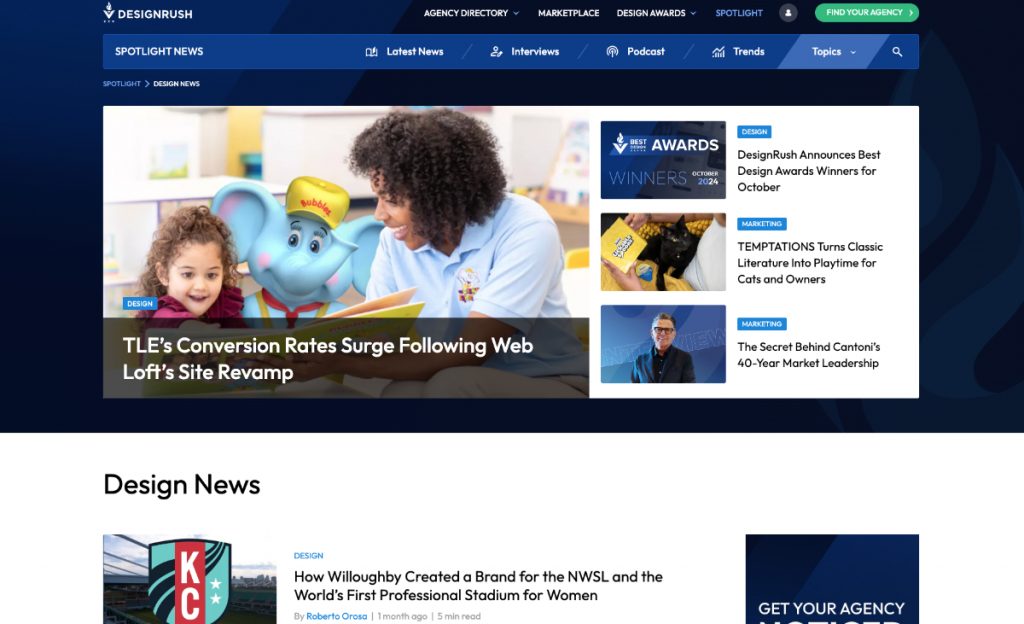
7 Outstanding Examples of B2B Company Blogs
B2B companies are the backbone of many economies. They employ a large number of people and generate a significant amount of revenue.
Think about this, 50% of the United States economy is related to B2B transactions. On top of this 82% of companies have at least some B2B interactions.
It’s not surprising, then, that so many B2B companies have blogs to support their business goals or tell their story in detail. Many also use blogs as an opportunity to share industry knowledge and recent developments.
If you want to succeed in your blog, you need to see examples of how these companies dominate the B2B content space.
But before we get into the nitty-gritty, let’s first do a quick rundown of how B2B blogs and B2C blogs differ.
B2B Blogs vs. B2C Blogs
The main difference between a B2B blog and a B2C blog is the purpose of the blog itself.
B2C blogs tend to focus on customer service and improving brand loyalty. At the same time, B2B businesses often use their blogs as a marketing tool to increase product awareness and drive traffic to their website.
B2B companies can still increase brand loyalty through their blog, but they generally educate readers about industry-specific issues and trends instead of price points, features, and benefits.
For example, if your company is in the SaaS industry and your product is talent management software, you’d want to tackle topics that cater to HR professionals. You would provide them with valuable tips or trends in the talent management space that will help them better align processes, recruitment, and performance.
Why Is Content Crucial for B2B Companies?
With the rise of social media, blogs have become more and more relevant in all aspects of the business. From public relations and real estate to fashion and finance, blogs cover a wide range of industries and topics.
One thing that makes blogging and B2B content marketing attractive for businesses is that it can help create a two-way conversation between the company and its customers. This gives customers a chance to voice their opinions or share stories about using a product or service.
Blogging can also help strengthen a brand’s online presence by attracting new customers, boosting website traffic, and increasing search engine rankings. In turn, this can increase sales from the leads you nurture in your content. This is why it’s an essential inbound marketing strategy.
What Makes a Good B2B Blog?
A good B2B business blog isn’t a one-hit wonder. Instead, it’s a comprehensive resource that adds value to the B2B industry conversation while standing out from all the other blogs out there.
It provides ideas, insights, opinions, and other valuable content that help a company’s B2B community learn from its experience, which can encourage them to connect and build a connection with the company. But this doesn’t work if companies don’t update their blog posts as new information pops up or touch on interesting and relevant emerging topics.
This means that good B2B blogs prioritize the customer experience above all else. They’re typically written by experts with years of experience — people who know exactly what works, what doesn’t, and how to navigate common B2B problems — for readers at every level. This helps them build a vibrant community around their brands.
7 Companies That Are Doing B2B Blogs Right
Here are six reputable companies and how they run their B2B blogs.
1. Dell
Dell’s corporate blog is streamlined, easy to navigate, and offers an impressive amount of information without being overwhelming.
Dell uses its blog to keep readers up to date with the latest news about the company and includes “how to” articles explaining how a particular feature or product functions.
This is an excellent example of how businesses can use their blogs as a helpful resource for customers who have questions about products or services they’ve purchased.

Besides this, the company uses its blog to cover critical topics in its industry, like the rise of generative AI. This is a common strategy employed by many B2B companies that want to establish themselves as thought leaders.
2. HubSpot
HubSpot, a leading marketing software company, has created an outstanding blog.
HubSpot’s marketing blog is broken down into sales, product marketing, growth, marketing strategy, and other useful topics for small business owners. The blog also offers expert advice and valuable insights on how to start your own blog.

HubSpot has taken full advantage of the power of blogging by creating a blog that is extremely easy to use and navigate. There are no animated images and interactions or complicated navigation menus. Instead, the website uses large images while keeping the text simple and to the point.
HubSpot is a great example of a B2B blog that is aimed at a broad audience. It’s not all about marketing or sales or products. It’s about how to do things better, and everything they put out on the site is geared toward that goal.
3. Salesforce
The Salesforce blog has been running since 2007. It is not the oldest B2B blog out there, but it is one of the longest-running and most successful.

It differs from a regular marketing page in that it is written in a more personal tone. That allows for more depth and gives the blog a more authentic feel.
The blog also differs from a regular marketing page in that it is updated more frequently, with about three posts per week. The content is evergreen, covering topics that have been around for years, but the articles are updated periodically, which allows them to remain relevant for a more extended period.
We love that one of the most exciting features is its use of a call to action to get you to subscribe to new content being released on the Salesforce blog. This encourages engagement between Salesforce and its customers and brings a personal touch to what would otherwise be a very corporate website.
4. SAP
SAP blog posts cover the company, business, technology vision, products, solutions, services, news, and events—all from global perspectives. Posts also include coverage of the latest developments of SAP products, technologies, and solutions as well as industry trends.

User-contributed posts make this an interesting platform for users to discuss various issues related to SAP’s products and solutions.
The site has an open-minded approach and features lots of useful and high-quality content (which you should outsource to a writing service if you don’t have the talent to write it in-house).
5. Ahrefs
Ahrefs offers a suite of tools for search engine optimization and content marketing. The company has been around since 2010 and started blogging a few years later. Today, the Ahrefs blog has become one of the most popular marketing blogs out there.

This isn’t just another boring marketing blog. It features interesting articles about marketing, SEO, and content marketing written by people who know what they’re talking about.
Each post is packed with actionable insight and practical advice you can easily apply to your own business. Ahrefs uses its products to show their value, an intelligent way to make readers understand why they should buy their products.
6. GE
While GE is an American multinational conglomerate, it is also one of the most popular B2B blogs. The company focuses on manufacturing products related to electrical engineering, energy, healthcare services, and other business-related services.

The blog is managed by the company’s global technology team, which aims to provide information about new technologies and innovations in the areas aligned with the company’s four businesses: energy infrastructure, aviation, healthcare, and transportation.
The blog also offers information about various events organized by the company around the globe.
The GE blog is not only informative but also has a persuasive tone. Readers find the posts very helpful because they’re written by experts. Posts also contain links to other related blogs published by third-party sources.
7. DesignRush
DesignRush is a leading B2B marketplace that connects businesses with leading digital marketing, design, and tech agencies. Since launching in 2017, it’s become a trusted resource for companies seeking expert partners to drive their projects forward. What sets DesignRush apart is its Spotlight section. More than just a typical blog, Spotlight delivers practical, in-depth content covering digital marketing, branding, and tech trends. It features real-world success stories and innovative strategies from top agencies, offering actionable insights that businesses can leverage for growth. For those aiming to stay competitive, DesignRush Spotlight is a must-read for inspiration and expert knowledge.

Best Practices of Good B2B Marketing Blogs
Behind the success of a great B2B blog lies the company team and several best practices. Let’s look at nine of the most important ones:
1. Use a Strategy
A blog is made up of many moving parts and requires ongoing (and persistent) efforts to thrive, especially in a competitive B2B industry. This means businesses can’t achieve significant growth if they’re shooting in the dark.
Companies that prioritize a digital marketing strategy get 55% more traffic and 67% more leads. A well-thought-out B2B content marketing strategy helps companies understand their ideal buyer personas, lay down goals, and create a plan to achieve what they want.
2. Keep it Authoritative
Good B2B blogs are always written from the expert point of view, with the writer’s first-hand experience clearly hinted at or talked about in the content.
For instance, HubSpot’s blogs are almost always written by professionals with years of experience in whatever topic they’re talking about. This helps the company make sure they provide the most value to their readers, which keeps them coming back.
3. Prioritize Research
B2B blogs ground their claims in the latest research and statistics. For instance, if a human resource company is talking about ways to reduce employee turnover, it may first explain why employee turnover is a problem using relevant statistics and case studies, and then provide the solution.
Similarly, if they’re presenting themselves as a solution, they may make their case using customer testimonials or company case studies.
4. Make It Comprehensive
Good B2B blogs are packed full of information. However, they don’t cram everything you need to know in a single article. Instead, they use topic clusters with multiple blogs explaining each aspect of a query.
These blogs may also cover complex topics from different angles while making sure the content remains evergreen, which means readers will find it relevant today and five years later. You can learn more in our blog post on growing organic traffic with content pillars.
5. Try to Be Helpful
Great B2B blogs focus on topics that are actually beneficial to their readers at every stage of the sales funnel instead of what’s trending. These blogs talk about everything you need to (or would ever want to) know about the topic you’re researching.
They are also to the point. Eliminate the fluff and focus on helping readers through relevant examples, definitions, and body content. Plus, they’re usually internally linked, which helps readers jump from one blog to another to find the information they want.
6. Structure the Process
The best B2B marketing blogs aren’t just managed by one admin. They’re the result of a marketing plan generated by a team of:
- Content strategists
- Subject matter experts
- Sales professionals
- B2B marketers
- Social media specialists (and influencer marketing experts in some cases)
- Content editors
- Email marketing experts
It truly takes a village to create the best B2B blog. That means making a blog successful requires businesses to invest in the right people.
7. Update It Often
The best blogs are also updated often, usually every week or month, with new articles or topic clusters. This keeps readers interested and keeps them coming back for more.
It also helps companies get more pages indexed on Google, climb up the SERP ranks, and show up on Google’s front page.
8. Utilize Visuals
Good B2B blogs also make use of infographics, maps, interactive images, GIFs, banners, videos, and other types of visual content to reinforce their messaging and make it easy for readers to understand the content.
However, these visuals are always used strategically. Too many images can slow down the page loading speed, which may spoil user experience and cause readers to bounce. The best blogs maintain the balance between visuals that provide clarity while keeping their website responsive.
9. Optimize for Results
Many businesses think they won’t have to do any else after hitting “publish”. And while that might be true if they’re publishing evergreen content, it won’t be if they’re providing industry-relevant current knowledge that becomes outdated in a year.
Successful B2B blogs optimize their performance by using KPI tracking tools like Google Analytics to look at the performance of their blogs, find gaps, and fill them quickly.
They also write blog posts for SEO. This is what gives them the edge over thousands of other blogs that take the one-and-done approach to blogging.
B2B Company Blogs FAQs
1. What is an example of a B2B blog?
Dell, HubSpot, Ahrefs, and Salesforce are great examples of companies with successful B2B blogs. This article looks at how these B2B companies use their blogs to generate brand awareness, establish credibility, and generate leads.
2. How do I write a B2B blog?
To write a B2B blog, you’ll need to create a content strategy, be authoritative, do your research, and try to be helpful to the readers by providing value and actionable insights. A good B2B blog is also always up-to-date.
3. How do I grow my B2B blog?
To grow your B2B blog, you’ll need to keep it constantly updated with fresh content. You must also invest in SEO through link-building.
Tap Into the Possibilities of B2B Blogging
Having a blog means you have control over your message. Your customers can easily find you and start a conversation with you.
Many companies are using blogs to reach their customers and promote their products and services. Some do an excellent job of presenting useful information to their target audience.
Blogging lets you provide information, engage in conversation, and promote your business all at the same time. The information you include in your blog posts helps customers understand their needs and make decisions. This high level of engagement makes it much more likely that they will look at other content on your site and, eventually, do business with you.
Interested in starting a conversation about how blogging can increase your SEO and brand awareness, and generate quality leads for your B2B marketing efforts? Contact our expert B2B SEO team at Lform today!



